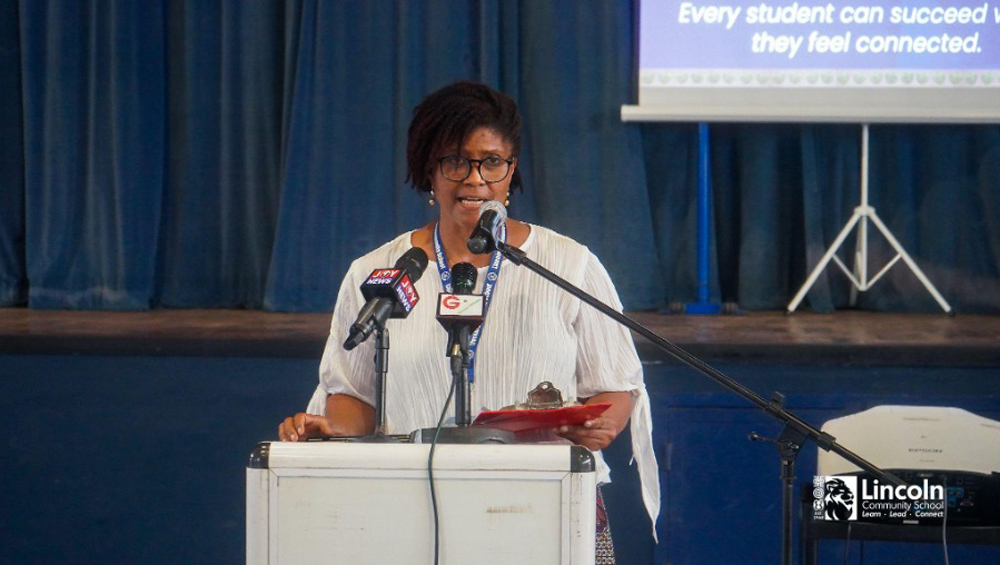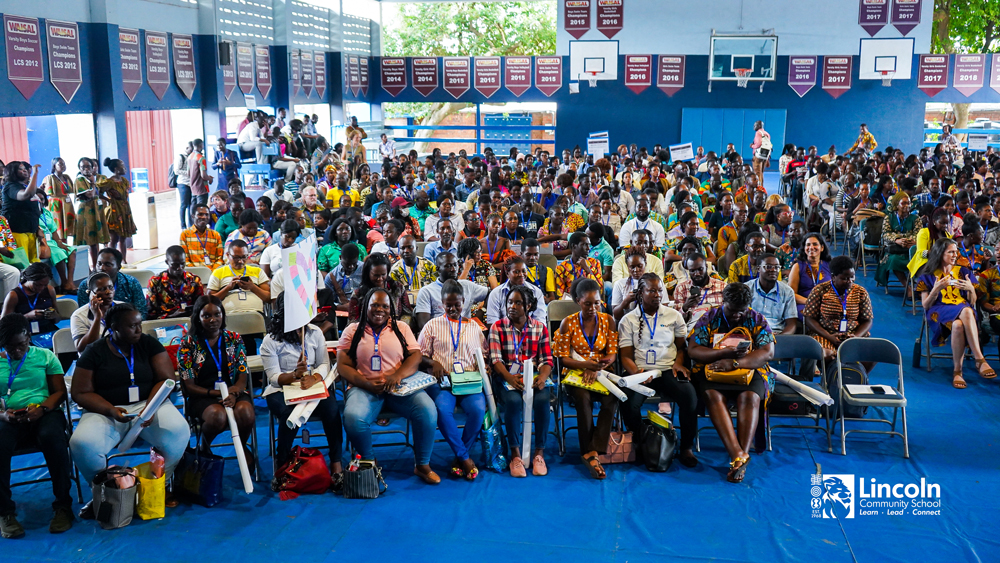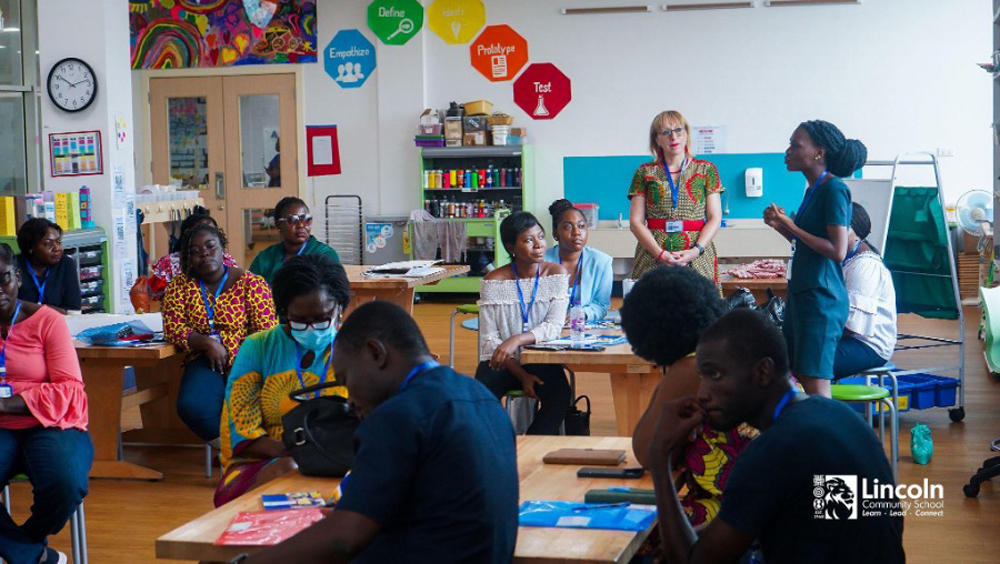
Lincoln Community School faculty of local and international teachers in the "Kwadu sa" fabric. (Photo source: Lincoln Community School)
--------------------------------------------------------------
When teachers leave their home countries for opportunities to teach, travel, and experience adventures abroad, they may do so for a variety of reasons but ultimately it is assumed that they are interested in making a difference in the education and learning opportunities for students around the world. International and local teachers did just that by volunteering to present in Accra, Ghana, where Lincoln Community School (LCS) hosts The Educators’ Network (TEN) Conference. We hope this idea may spread internationally and other international schools will look closely at how their school impacts their wider community.
2023 marked the return of this great tradition, the 12 such event. Teachers from regions in Ghana were hosted on our campus to come together and learn from one another. This year, over 600 participants attended 26 workshops dedicated to the theme, "Belonging - Every Student Can Succeed When They Feel Connected." Belonging is an area of focus we all professionally commit to at LCS. All presenters and volunteers received a "Kwadu Sa" wax print fabric to tailor an original outfit for the day.
 "Kwadu Sa" fabric (Photo source: Lincoln Community School)
"Kwadu Sa" fabric (Photo source: Lincoln Community School) "Kwadu Sa" is a local Twi word meaning a bunch of bananas, a symbol that depicts the beauty in unity or togetherness; a bunch of fruit growing and thriving from a single branch.
TEN is the brainchild of Letitia Naami Oddoye and was founded by her with the support of a group of PreK-12 Ghanaian educators from LCS who are passionate about improving teaching and learning. Facilitators of the TEN workshops are seasoned educators with extensive training in internationally accepted standards of teaching pedagogy and practice. They are experienced International Baccalaureate teachers who share a desire to contribute to the teaching profession and their ultimate goal is to improve learning among Ghanaian students across the nation. TEN’s mission is to provide Ghanaian teachers in local and private schools with training in research-based instructional pedagogy and to improve the standard of teacher instruction to ultimately enhance student achievement scores at all levels.

Workshops at the TEN Conference usually cover six divergent areas in education: literacy, math, French, science and technology, classroom management and pedagogy, and administration and leadership. This year, I presented within my area of specialization of learning diversity and chose universal design for learning (UDL) as my topic. UDL reflects one of our school’s eight learning principles: “We believe that differentiation of instruction, which honours diversity of all kinds, optimizes learning.” The session focused on UDL and its implementation to ensure that all learners can access and participate in meaningful and challenging learning opportunities with planning that intrinsically embeds differentiation and increases belonging and engagement.
We learned that UDL is encouraged by the United Nations’ Sustainable Development Goals (number four, Quality Education) as a means to “meet and adjust the learning of every student” to ensure inclusive and equitable education and promote lifelong learning opportunities for all by “maximizing accessibility and minimizing barriers.” This idea is echoed by the International Baccalaureate Organization (IBO), stating “Inclusion is an ongoing process that aims to increase access and engagement in learning for all students by identifying and removing barriers.” We learned that when we meet the needs of someone, the impact benefits everyone. UDL creates an inclusive environment that recognizes and values diversity and provides a framework for designing learning experiences that meets the needs of all learners.

We focused on a specific case study to practice identifying barriers to learning, such as poverty, language, hunger, access to health care, gender discrimination, home violence, cultural differences, local traditions, distance to the school, or the size and availability of resources for education facilities; then sought ways to eliminate those barriers. The IBO agrees, “UDL focuses on creating learning environments for all learners, including students with disabilities, students from culturally and linguistically diverse backgrounds and students who are gifted and talented.”
UDL is based on cognitive neuroscience and applies this brain research by identifying three neurological pathways to learning: engagement, representation, and action and expression.
Educators must find a way to provide multiple means of engagement, finding ways to motivate students by, for example, giving choices about the assignments relevant to their lives, allowing movement and hands-on learning as well as flexible groupings.
Providing multiple means of representation involves offering information in a variety of formats like text, audio, speech, video, and experiential learning.
Finally, we are all encouraged to find multiple means of action and expression, allowing students a variety of ways to interact with the material and ways to demonstrate what they have learned such as writing a test, giving an oral presentation, doing a group project, designing a mobile, or painting a picture.
"By giving choice, you automatically increase the level of student buy-in and open the doors to creativity. When using multiple ways to gain, then demonstrate knowledge, each student's voice can be built into the content, which will then empower them to better engage in the learning process and outcomes." R. Stiles

Although it takes place on an international school campus in the capital city of Accra, TEN is truly a happening event for all of Ghana. This adheres to a founding principle of providing local enrichment of our host nation’s education system at its core. We hope you are inspired and can create something similar where you are!
--------------------------------------------------------------
Since graduating from the University of Alberta in 1992, Ron Stiles has enjoyed a continuing career in general, bilingual, and special education across a variety of school settings, including a First Nations Reservation in Canada, a public school in Nebraska, international schools in the Czech Republic, China, and now Ghana. Ron is a married, Canadian citizen, the father of three, and a long-term resident of the Czech Republic.
LinkedIn: Roland Stiles